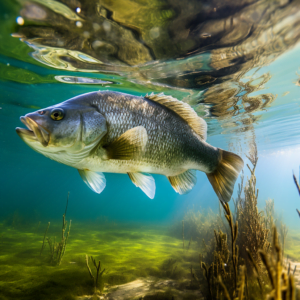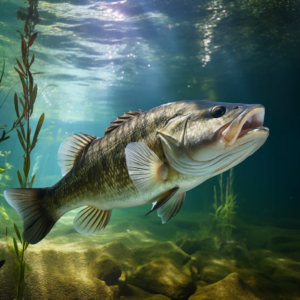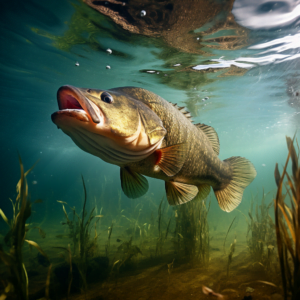So, you’re wondering if largemouth bass is considered a game fish? Well, let me tell you, my friend, this is a topic that’s got anglers all fired up! Largemouth bass, with its aggressive nature and impressive size, is indeed a popular target for many recreational fishermen. But whether it’s officially classified as a game fish or not can vary depending on where you are. Want to know more about this intriguing debate? Well, you’re in luck! In this article, we’ll dive deep into the world of largemouth bass and explore whether it’s considered a game fish or not.
Now, let’s talk about what it means for a fish to be classified as a game fish. In most cases, a game fish is a species that is sought after by recreational anglers for sport or leisure purposes. These fishes are often prized for their fighting abilities, size, and the challenge they offer when it comes to catching them. They are usually subject to specific regulations and restrictions to ensure their conservation and sustainable fishing practices. When it comes to largemouth bass, opinions can vary.
In some states and regions, largemouth bass is indeed considered a game fish due to its popularity among anglers and the regulations put in place to protect it. On the other hand, there are places where largemouth bass is not designated as a game fish, and there are no specific regulations governing its catch and release. The reasons for this classification can range from local fishing traditions to concerns about conservation efforts for other species in the same ecosystem. Curious to know more about the specifics? Well, stick around, my friend. In our upcoming article, we’ll dive deeper into the regulations and controversies surrounding largemouth bass as a game fish. Stay tuned!
What is a game fish?
Definition of a game fish
A game fish is a species of fish that is pursued and caught for recreational purposes rather than for commercial use. These fish are known for their fighting abilities and are prized by anglers for the thrill and challenge they provide during the fishing experience.
Characteristics of game fish
Game fish typically possess certain characteristics that make them desirable targets for recreational fishing. They are often strong swimmers with powerful muscles, allowing them to put up a fierce fight when hooked. Game fish are known for their agility and speed, making them a challenge to catch. These fish are also typically found in a variety of habitats, which adds to the excitement and adventure of pursuing them.
Largemouth bass
Description of largemouth bass
Largemouth bass (Micropterus salmoides) is a freshwater fish native to North America. It is known for its distinctive large mouth, which gives it its name. Largemouth bass have a greenish hue on their backs, fading to a lighter shade on their sides and eventually to a white belly. They have a muscular body and a flattened head, with a wide mouth that extends past their eyes.
Habitat and range of largemouth bass
Largemouth bass can be found in a variety of freshwater environments, including lakes, ponds, rivers, and reservoirs. They prefer areas with structures such as submerged logs, vegetation, and underwater rocks, which provide cover for ambushing their prey. Largemouth bass are native to the eastern and central United States but have been introduced to various parts of the world, including Europe, Asia, and South America.
Popular fishing techniques for largemouth bass
There are several effective fishing techniques for targeting largemouth bass. One popular method is using artificial lures such as plastic worms, crankbaits, and topwater baits. These lures imitate the natural prey of largemouth bass and are designed to entice them into striking. Another common approach is using live bait such as minnows or nightcrawlers. This method can be particularly effective in enticing larger bass to bite.
Game fish classification
Different categories of game fish
Game fish are typically classified into different categories based on their characteristics and the fishing regulations surrounding them. In general, these categories include freshwater game fish, saltwater game fish, and fly fishing game fish. Each category has its own set of rules and regulations governing the size, bag limits, and seasons for fishing these species.
Criteria for considering a fish as a game fish
Certain criteria are used to determine whether a particular fish species is considered a game fish. These criteria often include factors such as the fish’s fighting ability, popularity among anglers, and the economic impact of fishing for that species. Additionally, the fish’s natural habitat, range, and availability to anglers may also play a role in determining its classification as a game fish.
Largemouth bass as a game fish
Historical background of largemouth bass as a game fish
Largemouth bass has a long history as a popular game fish in North America. The sport of bass fishing gained prominence in the late 19th century, with the advent of recreational fishing clubs and the development of tackle specifically designed for bass angling. Largemouth bass quickly became a sought-after species, known for its strength and acrobatic leaps when hooked.
Importance of largemouth bass in recreational fishing
Largemouth bass is one of the most popular and sought-after game fish in North America. Anglers from all over the world travel to prime bass fishing locations in pursuit of this species. The thrill of hooking a largemouth bass, combined with its reputation as an aggressive and formidable opponent, has made it a favorite among recreational anglers. Bass fishing tournaments and competitions further highlight the popularity and significance of largemouth bass in the sport.
Controversies around largemouth bass as a game fish
Challenges to consider largemouth bass as a game fish
Despite its popularity, largemouth bass has faced some controversies regarding its classification as a game fish. Some argue that the predatory nature of largemouth bass poses a threat to native fish populations in certain ecosystems. They believe that bass predation can disrupt the balance of aquatic ecosystems and negatively impact other fish species.
Debates among anglers and fishing organizations
There are ongoing debates among anglers, fishing organizations, and researchers regarding the impact of largemouth bass on native fish populations. These debates often focus on the effects of bass predation and the need for management strategies to maintain a healthy balance in aquatic environments. The discussions also revolve around the importance of conserving largemouth bass populations while considering the ecological implications of their abundance.
Conservation efforts for largemouth bass
Conservation measures taken for largemouth bass
Conservation efforts for largemouth bass have been implemented to ensure the sustainability and preservation of this iconic game fish. These efforts include the establishment of fishing regulations, such as size and bag limits, to maintain healthy fish populations. Additionally, habitat restoration projects and the creation of protected areas have been undertaken to provide suitable environments for largemouth bass to thrive.
Role of fishing regulations in protecting largemouth bass populations
Fishing regulations play a crucial role in protecting largemouth bass populations from overfishing and ensuring their sustainable management. Size limits and bag limits are implemented to prevent the excessive harvest of immature bass and preserve the breeding stock. Proper enforcement of these regulations helps maintain a balance between the demand for recreational angling and the conservation of largemouth bass populations.
Economic impact of largemouth bass fishing
Revenue generated by largemouth bass fishing industry
Largemouth bass fishing has a significant economic impact, generating billions of dollars annually. Anglers contribute to the local economies by spending money on fishing equipment, boat rentals, lodging, and other related services. The popularity of bass fishing also attracts tourism and creates job opportunities in areas with prime bass fishing destinations.
Businesses and local economies benefiting from largemouth bass fishing
Various businesses and industries benefit from largemouth bass fishing. Tackle manufacturers, boat manufacturers, fishing guides, bait and tackle shops, and tourism-related businesses all rely on the anglers who pursue largemouth bass. Moreover, many local economies experience a boost in revenue from tourism, as anglers from different regions visit these areas to fish for trophy largemouth bass.
Largemouth bass tournaments
Popularity of largemouth bass tournaments
Largemouth bass tournaments are immensely popular in the fishing community. These tournaments provide an opportunity for anglers to showcase their skills and compete against others in a variety of fishing techniques. The competitive nature of these events adds an extra level of excitement and camaraderie among participants.
Professional bass fishing competitions
Professional bass fishing competitions have gained significant attention and sponsorship in recent years. These events attract top anglers from around the world who compete for substantial cash prizes and sponsorships. Professional bass fishing has further elevated the status of largemouth bass as a premier game fish and has helped to foster a larger fan base for the sport.
Sustainable fishing practices for largemouth bass
Catch and release techniques for largemouth bass
Catch and release practices play a vital role in the conservation of largemouth bass populations. Anglers are encouraged to release any undersized or unwanted fish, allowing them to grow and reproduce. Proper handling techniques, such as using appropriate tackle and minimizing stress on the fish, help to increase the survival rate of released bass.
Environmental considerations for sustainable fishing
Sustainable fishing practices for largemouth bass also extend beyond catch and release. Anglers should be mindful of their impact on the environment and take steps to minimize their ecological footprint. This includes properly disposing of fishing line and other waste, respecting no-fishing zones, and avoiding the introduction of invasive species to new waters.
Conclusion
Summary of largemouth bass as a game fish
In conclusion, largemouth bass is considered a prominent game fish due to its fighting abilities, popularity among anglers, and economic impact on local economies. Its historic significance and cultural importance in recreational fishing cannot be denied.
Significance of proper management and conservation for future generations
However, large debates and controversies surrounding largemouth bass as a game fish highlight the need for responsible management and conservation efforts. Conservation measures, fishing regulations, and sustainable fishing practices are vital to ensure the long-term sustainability of largemouth bass populations and the overall health of aquatic ecosystems. By practicing responsible angling and supporting conservation initiatives, anglers can help preserve the legacy and enjoyment of largemouth bass fishing for future generations.




